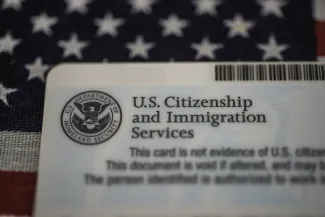
Colorado AG Weiser sues Mesa County sheriff’s deputy over ‘illegal coordination’ with ICE
Colorado Attorney General Phil Weiser said Tuesday that he had taken legal action against a Mesa County sheriff’s deputy over an alleged violation of state laws prohibiting coordination between local police and federal immigration agents.
The civil complaint, filed in Mesa County District Court, alleges that Investigator Alexander Zwinck “intentionally violated Colorado law” by sending messages to a Signal group chat with federal law enforcement, leading to the arrest of a Utah college student last month. State law bars government employees, including law enforcement officers, from sharing information for the purposes of “investigating for, participating in, cooperating with, or assisting in federal immigration enforcement.”

Phil Weiser
Caroline Dias Goncalves was detained by ICE in Grand Junction on June 5, shortly after being pulled over by Zwinck in a separate traffic stop, from which she was let go with a warning. Zwinck has been placed on leave amid an internal investigation into whether the messages complied with state law and departmental policies.
Body camera footage released by the department at the time showed a traffic stop lasting nearly 20 minutes, during which Zwinck asked Dias Goncalvez, who was born in Brazil and brought to the U.S. by her parents as a 7-year-old, whether she was “born and raised” in Utah, after noting she had “a little bit of an accent.”
Weiser’s lawsuit alleges that Zwinck sent a photo of Dias Goncalves’ license to the Signal chat within minutes of pulling her over, and federal agents ran her information through “several databases accessible only by federal law enforcement.”
“Four minutes later, a federal immigration officer informed Deputy Zwinck in the Signal Chat that the officer’s searches revealed no criminal history. The immigration officer stated: ‘Not seeing crim history, but I believe she has immigration issues. We are confirming,'” the lawsuit says.
Zwinck continued to communicate with federal agents throughout the traffic stop, during which he eventually asked Dias Goncalves to exit her vehicle and come to the passenger seat his patrol car while he did “paperwork,” a move that Weiser’s lawsuit characterizes as “stalling.” He then provided information about Dias Goncalves’ vehicle and direction of travel, and told federal officers “nice work” after hearing she was detained.

“These actions by the sheriff’s deputy were for the sole purpose of immigration enforcement,” Weiser said in a press conference in Denver. “He assisted federal immigration officers apprehending the driver after the routine traffic stop and where there was no relevant criminal activity.”
Dias Goncalves, a nursing student at the University of Utah with no criminal record, was then held at the Immigration and Customs Enforcement detention center in Aurora for 15 days before being released on bond, an experience she described as “nightmare.” The share of people taken into ICE custody despite having no criminal record has risen sharply since January.
“She was away from her home, her friends, her family, and she was filled with fear,” said Weiser. “This action that happened to her was wrong.”
Weiser said his office’s focus is on “primarily stopping this from happening again.” As a civil action, the state’s lawsuit could lead to an injunction, fines or other remedies through litigation, or the defendant could choose to enter into a consent decree agreeing to follow state law.
“That’s going to be up to the sheriff’s deputy how they approach this litigation, whether it’s through consent or through a adversarial proceeding,” Weiser said.
















